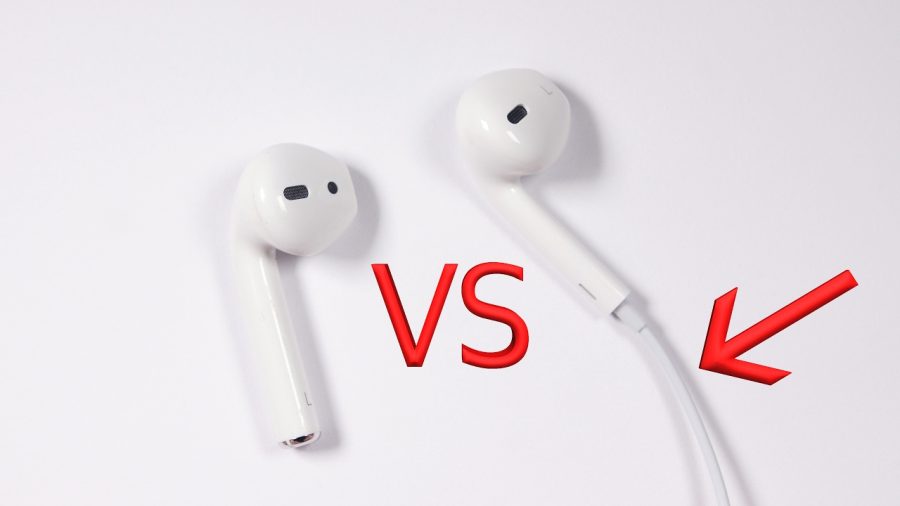The Probs with Pods: Why Wired Headphones Should Return
April 13, 2022
Over the last decade, wireless headphones, specifically AirPods, have become ubiquitous. These captivating contraptions have revolutionized the way in which we consume music, but there are some major drawbacks that most people fail to recognize. AirPods, although flashy, are incredibly unreliable. They do not provide the listener with adequate sound quality and are battery-operated, which means they need to be charged. All but one version includes three pieces, leaving the user responsible for all parts of their listening devices, which can be easily misplaced or stolen. Wired headphones provide the user with a better experience entirely, both in the short and long term.
Apple released their first generation of headphones in 2001, giving them no official title. In 2007, with the simultaneous release of the iPhone, Apple modified their headphones, adding volume buttons. In 2016, Apple introduced the long-awaited “AirPods” with a shaky release. After great anticipation, and general software issues subsequent to the release, Apple’s projected sales for the product were underwhelming. However, sales quickly recovered and skyrocketed. This led Apple to create three generations of the product, most recently AirPods Pro. AirPods are undoubtedly the most popular wireless headphone worldwide, and seemingly at Great Neck South High as well. It’s a rarity to stroll down the main hall or arrive in class without seeing countless AirPod users. They are discreet, but they aren’t much else. You need to open your eyes (and ears) to the obvious drawbacks of AirPods, and make the switch back to wired headphones.
Let’s start with AirPods’ most flagrant problem: their price. Apple no longer carries first generation AirPods, presumably because they have already grown too obsolete to meet the company’s standards. The least expensive version that is currently carried by Apple is the second generation AirPods, priced at $129. The most expensive version is the AirPods Max, priced at $549. Apple currently has their wired headphones listed at $19.00. Apple’s wireless headphones, which provide no benefit compared to wired headphones (other than being wireless) cost hundreds of dollars simply because they are “trendy” and “fashionable.” You’d think that AirPods would be durable if they were priced so high, but experience has proven opposite.
The secret that Apple doesn’t want you to know is that AirPods are powered by rechargeable lithium-ion batteries that at best are expected to have a lifespan of 2 years before complete deterioration. In layman’s terms, your AirPods will not last longer than two years. Headphones have the same lifespan, but it is $19 versus $129–$549. They are easily replaceable due to their low price. However, you are much less likely to lose wired headphones as opposed to AirPods. All AirPods versions excluding the AirPods Max are three pieces: the left pod, the right pod, and the case. There is nothing attaching the pieces besides an inefficient magnetic layering in the case and the case covering, of course. If the AirPods were dropped, even if all the pieces were together, each individual piece would scatter.
According to CBS News, of the $10–$12 billion in AirPods sold in 2019, 5–7% of those sales derive from replacement AirPods pods and cases. That is over $700 million spent to replace missing headphone pieces, when people could have made an effortless one-time purchase of wired headphones for approximately $19.
In addition to losing their AirPods, users also have to worry about charging them. AirPods are no different from most other Apple products in the sense that they need to be charged. As previously stated, AirPods are powered by rechargeable lithium-ion batteries. First generation AirPods can last for up to five hours of listening or two hours of talk time on one full charge. Second generation AirPods have an extended talk time of 3 hours. AirPod Pros have a listening time of four and a half hours and a talking time of three and a half hours. If your AirPods die, and you have no time to recharge or no access to a charging port, you’re just out of luck. With wired headphones, you won’t ever again be scrambling to charge your dead AirPods in the main hall charging ports before the first bell. Wired headphones provide the user with freedom and eliminate the stress that AirPods create.
Along with the multitude of deficiencies that AirPods have, there is an advantage that I am forced to address. During exercise, especially high-movement activities, AirPods may be more beneficial for the user than wired headphones. Due to the string-like nature of wired headphones, they may interfere with certain types of workouts such as running or weight lifting. Nonetheless, I am not writing specifically for gym-goers. If you intend to use headphones for exercising, AirPods are the better choice. But for virtually all other tasks, wired headphones are the obvious answer.
AirPods are nothing more than an overhyped and overrated product that Apple users are subliminally forced to buy into, much like the rest of their Apple products. Don’t allow yourself to be pushed into whatever direction society tells you to go, and don’t give in to trends while simultaneously sacrificing your listening experience, and your wallet. AirPods will forever be inferior to wired headphones. Make the smarter and more economic choice: use wired headphones.






